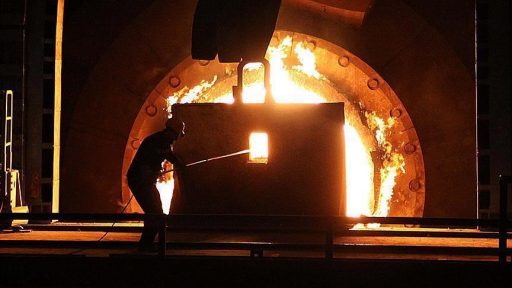- Home
- >
- Daily Accents
- >
- Did Trump just started a trade war – Europe definitely thinks so

Did Trump just started a trade war - Europe definitely thinks so

The European Commission warned President Donald Trump on Friday that it "will not sit idly" following the U.S. leader's decision to slap tariffs on steel and aluminum imports.
"We strongly regret this step, which appears to represent a blatant intervention to protect U.S. domestic industry and not to be based on any national security justification," said European Commission President Jean-Claude Juncker in a statement.
Trump on Thursday announced that the United States will impose a 25 percent tariff on steel imports and a 10 percent tariff on aluminum imports as early as next week.
"The EU has been a close security ally of the U.S. for decades. We will not sit idly while our industry is hit with unfair measures that put thousands of European jobs at risk," said Juncker.
The European Commission is the executive branch of the European Union.
The Commission next will take the matter to the World Trade Organization, the statement said. The WTO refused to comment on the news when contacted by CNBC.
European Trade Commissioner Cecilia Malmström, who is currently touring Asia, said the problem facing the global steel and aluminum market is overcapacity caused by "non-market based production."
Malmström did not name any countries that are overproducing steel and aluminum. China has been criticized for years for dumping its state-subsidized, excess steel on Europe, the United States and other countries.
Such a tactic drives down prices to unsustainable levels for domestic producers. China denies that it engages in dumping, and it does not rank among the top 10 sources for U.S. steel imports, according to data from IHS global Trade Atlas. China is the fourth biggest exporter of aluminum to the United States.
"This can only be addressed at the source, and by working with the key countries involved. This go-it-alone action by the U.S. will not help," said Malmström.
"These U.S. measures will have a negative impact on transatlantic relations and on global markets. In addition, they will raise costs and reduce choice for U.S. consumers of steel and aluminum, including industries that import these commodities," she said. "The EU will seek dispute settlement consultations with the U.S. in Geneva at the earliest opportunity."
It's still too early to tell how other governments may respond — so far, Canada and the European Union have promised strong countermeasures but didn't provide details.
Cornell University Professor Eswar Prasad told CNBC that countries may hit back in the form of "surgical strikes," meaning they may choose to target specific U.S. products.
For that reason, it's worth looking at what the United States is selling to the nations most at risk from Trump's tariffs.
Below are the U.S.-made products that make up the largest percentage of total exports to those five countries, based on 2016 data from the Observatory of Economic Complexity, an MIT site that compiles international trade statistics.
Canada
Vehicle parts are 6.4 percent of U.S. exports to Canada
Cars: 5.5 percent
Delivery trucks: 4 percent
Refined petroleum: 3 percent
Brazil
Refined petroleum: 12 percent
Packaged medicaments (chemical products): 2.4 percent
Medical instruments: 2.1 percent
Wheat: 1 percent
South Korea
Integrated circuits: 6.4 percent
Cars: 3.7 percent
Photo lab equipment: 4.5 percent
Corn: 2.1 percent
Russia
Construction vehicles: 4.2 percent
Vehicle parts: 3.2 percent
Cars: 2.8 percent
Soybeans: 1 percent
UAE
Cars: 8.7 percent
Broadcasting equipment: 5.8 percent
Gold: 3.7 percent
Explosive ammunition: 3.7 percent
Source: Bloomberg Pro Terminal
Jr Trader Alexander Kumanov
 Varchev Traders
Varchev Traders Read more:
If you think, we can improve that section,
please comment. Your oppinion is imortant for us.











